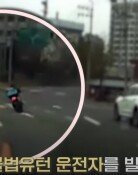Unification yakgwa presented to soldiers as Chuseok gift
Unification yakgwa presented to soldiers as Chuseok gift
Posted September. 10, 2014 04:51,
Some 12,000 troops at the Army Sixth Infantry Division received special comfort gifts on this years Chuseok (thanksgiving) holiday. Every single solider in the division was presented a box containing 10 pieces of snack named Unification Yakgwa (traditional Korean honey and sesame cookies literally meaning medicinal cookies). Unlike original yakgwa, Unification Yakgwa was crispy and sweet like pie, and thus agreeable to the palate of the young new-generation soldiers. Looking into the message, We depend on you (for security) of the Republic of Korea," the soldiers might have thought about the intention of those who presented them the cookies.
Unification Yakgwa was a presentation by Lee Ae-ran, director of the institute of traditional North Korean foods and culture, and the first female North Korean defector that received a doctorate degree in South Korea. Having majored in food and nutrition, Lee started in 2008 a business producing traditional North Korean foods including Unification Yakgwa, Joseon doenjang (soybean paste), chapssal sundae (sticky rice sausage) from North Pyongan Province, and gamja mandu (potato dumpling) from Hamkyong Province. Unification Yakgwa is reinstatement of Kaesong Yakgwa, a type of traditional yakgwa that used to be offered to the king in the past. Lee launched the campaign to send Unification Yakgwa in last years seollal (Lunar New Years Day). She has sent Unification Yakgwa to the Second Marines Division in Baengnyeong and Yeonpyeong islands, and the Army Fifth Infantry Division thus far.
It took a month for more than 10 people to bake manually the 120,000 pieces of yakgwa that were sent to the Sixth Infantry Division. Employees of her institute took part in yakgwa-making, but mostly North Korean defector-turned college students made paste, and rolled paste and fried it to make them crispy during summer vacation. Lee said, Colleges students who are defectors from the North took extra care when making the cookies because they are gifts for young soldiers who have suffered mental pain and deteriorating morale lately due to a string of mishaps and incidents at the barracks. The cost was covered with donations from Love Korea Supporters Group, Samheung Collection, and Nam Incheon Broadcasting.
The Sixth Infantry Division was a unit that also experienced a crisis due to a beating and sexual harassment case involving a son of Gyeonggi Mayor Nam Kyung-pil. It would be great if soldiers renew their commitment, shrugging off the current crisis facing the military as if it is yakgwa for healing. Lee said she felt sorry because although she sent letters asking for donation to more than 20 conglomerates, none of them replied. Even admitting that the economy is in a bad shape, it is regrettable this reaction of indifference is hardly compatible with the prevailing public sentiment that Korean society needs to cheer up soldiers who are suffering from distress. It is hoped that companies pay just one 100,000th of the attention it gives to the National Assembly in next years Chuseok holiday to help shore up Korean soldiers morale.
Headline News
- Med professors announce intention to leave hospitals starting Thursday
- Bridge honoring Sgt. Moon Jae-sik unveiled in Pennsylvania
- Chief of Staff Chung tells presidential secretaries to stay away from politics
- US FTC bans noncompete agreements
- N. Korea launches cyberattacks on S. Korea's defense companies







